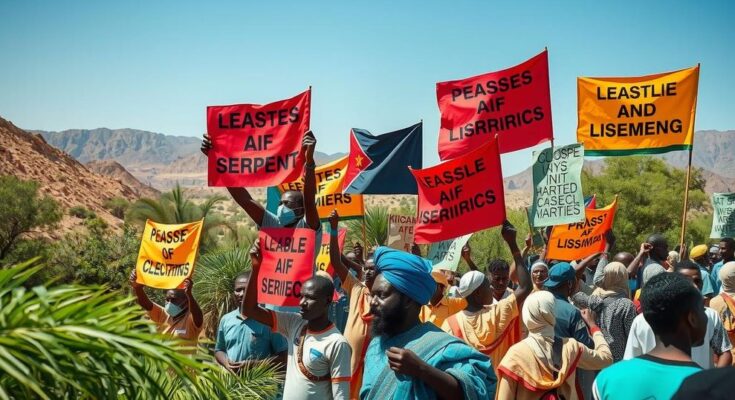The U.S. and Israeli plan to forcibly relocate Palestinians from Gaza to Somaliland is facing discontent amid Somaliland’s quest for independence. Despite Somaliland’s potential interest, strong public opposition and recent regional instability complicate the proposal. Somalia’s foreign minister has firmly rejected any displacement plans, supporting the Palestinian cause and reinforcing Somalia’s pro-Arab stances.
The proposed plan by the United States and Israel to forcibly relocate Palestinians from Gaza has met with significant discontent in Somaliland. Following rejection from various Arab nations regarding President Trump’s vision of a ‘Middle East Riviera,’ attention has turned to the Horn of Africa as a potential location for resettlement, with Somaliland being a primary focus due to its longstanding aspiration for recognition as an independent state.
The Associated Press reported that discussions involving American and Israeli officials are taking place with both Somalia and Somaliland. Somaliland, known for its relative stability compared to the rest of Somalia, has sought international validation for its independence for decades. In 2022, it extended an offer to the United States for military access to its strategic seaport and airfield in exchange for recognition.
Trump’s plan, which proposes to permanently relocate Gaza’s 2.3 million residents while the U.S. takes control for redevelopment, has been met with skepticism. Notably, Israeli far-right factions have shown interest in this initiative, viewing it as a feasible solution to their longstanding issues with Palestinians.
Nevertheless, strong global pro-Palestinian sentiments, especially following Israel’s recent military actions in Gaza, render the practicality of such a plan questionable. An expert from Somaliland, Moustafa Ahmad, emphasized that while Somaliland’s leaders may consider U.S. interests, public solidarity with Palestinians complicates any resettlement discussion. Ahmad highlighted that even allies of the U.S. have dismissed similar proposals.
The United Arab Emirates (UAE) could play a pivotal role, given its support for Somaliland’s recognition and relations with Israel, potentially facilitating negotiations. However, the UAE has not vocally condemned Israel’s actions while supporting an Egyptian-led reconstruction plan that contradicts Trump’s proposal.
Somaliland’s President, Abdullahi “Irro” Abdirahman, has publicly denied ongoing negotiations with the U.S., asserting that any formal proposal would require thorough evaluation by his government. In contrast, Somalia faces a separate crisis, with challenges to its federal structure under President Hassan Sheikh Mohamud.
Somalia is experiencing internal turmoil, with Puntland’s declaration of independence exacerbating divisions, and militant groups like Al-Shabaab intensifying their attacks. Amidst this instability, Somalia’s foreign minister has affirmed the nation’s refusal to entertain any plan involving Palestinian displacement, reinforcing its support for Palestinian rights and rejecting Trump’s proposal endorsed at an Arab League summit.
Somalia’s strengthened relationships with Arab states and Turkey further exemplify its commitment to the Palestinian cause. Ahmad noted that extremist groups in Somalia have historically woven the Palestinian struggle into their rhetoric, emphasizing Islamic solidarity. Given the current socio-political environment, it is improbable that Mogadishu will jeopardize its remaining stability for foreign resettlement proposals.
In conclusion, the potential U.S. plan to displace Palestinians from Gaza to Somaliland faces significant opposition. While Somaliland’s leadership may find the prospect of recognition appealing, strong public sentiment against resettlement complicates this initiative. Furthermore, ongoing instability in Somalia and a robust alignment with pro-Palestinian values underscore the challenges such a plan might encounter. Ultimately, the situation reflects broader regional tensions and the complexities of international diplomacy regarding long-standing disputes over Palestinian sovereignty.
Original Source: www.newarab.com




